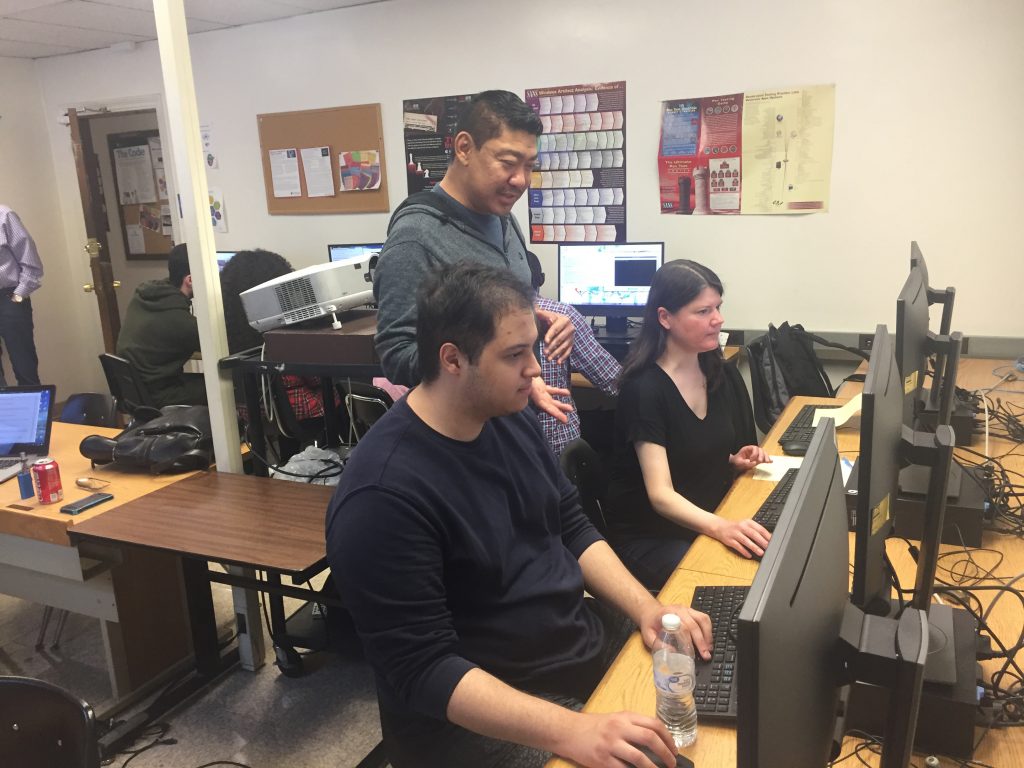 iQ4 is a virtual internship program that allows higher education and private sector employers to bridge skills gaps. Through this technology, the Cybersecurity Workforce Alliance (CWA) formed as a response to the cyber security workforce skills shortage. Their virtual online internship offers experiential learning based on solving real-world problems. This past spring, Saint Peter’s students enrolled in the four-month long internship to great success. The skills learned in the internship are equivalent to a year of on-the-job training. CWA aims to extend the workplace into the classroom and they do so by engaging Fortune 100 companies to analyze what skills students need to be successful at these companies.
iQ4 is a virtual internship program that allows higher education and private sector employers to bridge skills gaps. Through this technology, the Cybersecurity Workforce Alliance (CWA) formed as a response to the cyber security workforce skills shortage. Their virtual online internship offers experiential learning based on solving real-world problems. This past spring, Saint Peter’s students enrolled in the four-month long internship to great success. The skills learned in the internship are equivalent to a year of on-the-job training. CWA aims to extend the workplace into the classroom and they do so by engaging Fortune 100 companies to analyze what skills students need to be successful at these companies.
Ghenaj Sanih ’20 is a cyber security student from Jersey City. She would like to continue her education in the master’s program in cyber security (learn more about the program here) and has an interest in photography. Michael Scalia ’19 is a cyber security student from Bayonne and plans to enroll in the master’s program in cyber security. His interests include blockchain technology and programming. Through the program, both students were able to work with advisers from different companies such as Fidelity Investments, ADP, 4600 Norwich Group, Bay Dynamics and the Federal Reserve Bank of Chicago, along with iQ4.
What did you learn from the program?
Sanih: The iQ4 internship gave me a real life experience to what a cyber threat analyst would do if there was an internal cyber-attack on a company (in our case, espionage). It also helped me understand what the other roles entail and how we need to work together and listen to each other in order to prevent the company’s downfall by responding to cyber threats.
Scalia: I learned how to apply the techniques, procedures and principles that I learned through my coursework in a case study mimicking real-life security scenarios. I also learned how to work as part of a team to assess the security of a telecommunications network and determine the changes needed to enhance the corporation’s ability to prevent, mitigate and recover from attacks against the system.
What were you surprised to learn?
Sanih: During the internship, I was surprised to learn the different aspects of how to figure out who was the attacker and how to prevent this. Not only that, but how strict companies are with their technology. For example, there are “no phone” policies that some company’s stress so employees are not allowed to bring their personal phone to work. Also, there are cases where extreme attacks occur such as an employee stealing algorithms, selling them and then dodging the law. A scenario like that would be hard for the company’s cyber team to locate, so the team would have to contact the FBI for help.
Scalia: I was surprised to learn so many “soft skills” through the experience. For example, I considered myself a good public speaker, but found it difficult at first to convey my ideas to the mentors, whom I knew had a much better understanding of the topics than I did. Through the weekly presentations, I gained confidence in my ability to articulate my points to a group of experts.
How did this internship enhance what you were already learning?
Sanih: Coming into this internship, I wasn’t very knowledgeable of what really happens in a company when there is a cyber-attack. I knew there were policies and basic actions that needed to be taken (inform employers, find the source, etc.). But I didn’t know how it was done; I didn’t know how to start. The internship really helped me understand how to detect and end the malicious threat. The internship was organized into different categories each week, so the steps to identifying and solving the problem were clear.
Scalia: Applying the principles I learned in the classroom to the intensive case study allowed me to gain a much greater understanding and appreciation of said principles and the process of employing them in a comprehensive security infrastructure. Through the iQ4 program, I was able to assist Alberto LaCava, Ph.D., CISSP, chair of the department of computer & information science, to help set up the Cyber Lab in preparation for our new master’s level blockchain technologies course. This course was offered for the first time in the summer, and provided a deep dive into learning how blockchain technology works, from a business as well as technical standpoint and a deeper insight into how blockchains are transforming industries and organizations.
“I consider the great value of the Virtual Internship the contact with industry advisers, a direct ‘shot in the arm’ packed with reality and a good sense of what you can expect your work experience of the future to be. Getting this experience early is invaluable!” said LaCava.
This fall semester, the next group of iQ4 cyber interns is working with Suman Kalia, Ph.D., assistant professor of computer and information sciences, and collaborating with industry mentors from Fidelity Investments, Citizens Bank, Flashpoint, Bay Dynamics and the Federal Reserve Bank of Chicago. Classes involve live video-conferences with mentors from these organizations, who provide real world advice and training. The student teams are gearing up for their final consulting project, in which they have adopted the role of cyber security analysts, assess realistic threats and cyber risks in a real organization and present their final presentations to a simulated board of directors.
